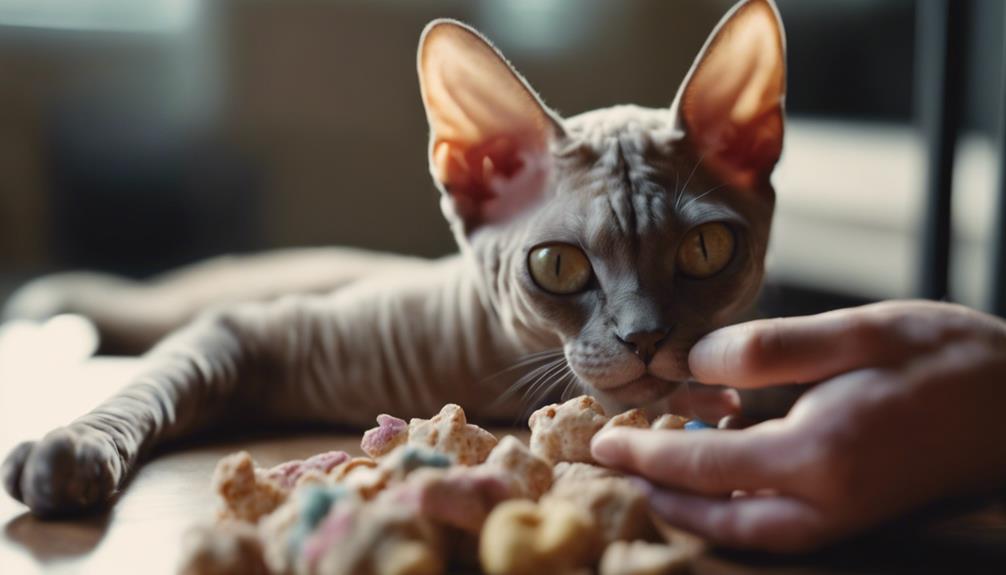As a Devon Rex owner, I discovered that 75% of these cats can be quite cautious around new people. Building trust with your Devon Rex is crucial for a strong bond, but it can take time and effort.
Have you ever wondered how to navigate this journey effectively? Let’s explore seven practical tips that can help you establish a trusting relationship with your Devon Rex and create a harmonious environment for both of you.
Key Takeaways
- Recognize behavior patterns and body language cues for understanding
- Use positive reinforcement and interactive play for trust-building
- Practice patience, consistency, and respect for boundaries
- Seek professional help if needed for tailored strategies and support
Understanding Your Devon Rex’s Behavior

To truly build trust with your Devon Rex, it’s essential to first understand their unique behaviors and tendencies. Devon Rex cats have distinctive behavior patterns that can vary from other breeds. Paying attention to their body language is crucial in deciphering their moods and needs.
They’re known to be social and affectionate cats, enjoying interactive playtime with their owners. Trust building with a Devon Rex involves patient socialization techniques, gradually introducing them to new environments, people, and experiences. These cats thrive on companionship and are known to form strong bonds with their human family members.
Start Training Early
Starting training early with your Devon Rex is key to establishing a strong foundation of trust and communication. Socialization tips and training methods play a crucial role in shaping your cat’s behavior. Early interaction helps your Devon Rex feel comfortable in various environments and with different people, reducing anxiety and fear responses in the long run. When beginning training, keep sessions short and positive to maintain engagement and prevent overwhelm. Consistency is key – set a routine and stick to it. Use playtime as a way to bond and reinforce good behavior. Remember, building trust takes time, so be patient and understanding throughout the training process.
| Socialization Tips | Training Methods | Trust Building |
|---|---|---|
| Introduce new experiences gradually | Positive reinforcement techniques | Establish a safe environment |
| Encourage interactions with other pets | Clicker training | Spend quality time together |
| Reward calm behavior around strangers | Target training | Communicate through body language |
| Expose to various sounds and environments | Interactive toys | Respect their boundaries |
| Use treats to create positive associations | Leash training | Build a predictable routine |
Use Positive Reinforcement Techniques

Using positive reinforcement techniques is a highly effective way to encourage desired behaviors and strengthen the bond between you and your Devon Rex. Clicker training, where a clicking sound marks the precise moment your cat performs the desired behavior, can be a powerful tool. Pairing this with rewards such as treats reinforces good behavior.
Behavior shaping is another key aspect; by breaking down complex behaviors into smaller achievable steps, you can guide your Devon Rex towards the desired outcome. Treats should be high-value and reserved exclusively for training sessions to maintain their effectiveness.
Be Patient and Consistent
Exercising patience and maintaining consistency are foundational pillars in building trust with your Devon Rex. Trust building activities, such as spending quality time together, engaging in interactive play sessions, and offering treats as positive reinforcements, require a patient approach.
Each cat is unique, and establishing rapport takes time. Consistency in your actions and reactions is crucial for your Devon Rex to feel secure and understand what’s expected. By being patient during training sessions and consistently rewarding good behavior, you’re actively showing your cat that they can trust you.
Respect Your Devon Rex’s Boundaries

As a Devon Rex owner, it’s crucial to respect your cat’s boundaries to build a strong bond.
Setting clear expectations helps your cat understand what’s acceptable behavior.
Understanding their body language and giving them space when needed fosters trust and respect in your relationship.
Setting Clear Expectations
To establish a strong foundation of trust with your Devon Rex, it is crucial to set clear expectations and respect your cat’s boundaries right from the beginning. When it comes to training your feline companion, effective communication methods and trust-building techniques are essential. Behavior modification and training strategies play a significant role in shaping your Devon Rex’s behavior positively. By understanding your cat’s needs and preferences, you can create a safe and comfortable environment that fosters mutual respect and trust. Remember, consistency is key in setting clear boundaries and expectations for your Devon Rex. By being patient and understanding, you can build a strong bond based on trust and respect.
| Communication Methods | Trust Building Techniques | Behavior Modification | Training Strategies |
|---|---|---|---|
| Verbal cues | Positive reinforcement | Redirecting unwanted behaviors | Clicker training |
| Body language signals | Quality time together | Consistency in routines | Interactive play sessions |
| Reward-based training | Respect for boundaries | Encouraging good behavior | Patience in teaching new skills |
Understanding Body Language
Understanding your Devon Rex’s body language is crucial in respecting your cat’s boundaries and building a strong foundation of trust. When it comes to reading cues from your Devon Rex, pay attention to subtle signs they display through their body language. Here are some key points to consider:
- Tail Position: A raised tail indicates a happy or curious cat, while a tucked tail may signal fear or discomfort.
- Ear Movements: Forward-facing ears show interest, while flattened ears can indicate aggression or fear.
- Eye Contact: Extended eye contact is a sign of trust, while dilated pupils may mean your cat is feeling threatened.
- Body Posture: A relaxed, open posture suggests comfort, while a tense body may indicate stress or anxiety.
Give Space When Needed
Respecting your Devon Rex’s boundaries by giving them space when needed is essential for fostering a trusting relationship with your cat. Just like humans, cats need their personal space.
Watch for communication cues that indicate when your Devon Rex may want some alone time. If your cat retreats to a quiet corner or shows signs of agitation, it’s important to respect their need for space.
By understanding and honoring these boundaries, you show your Devon Rex that you respect their individuality and feelings.
When engaging in bonding activities, always be attentive to your cat’s reactions. This sensitivity to their needs will strengthen the bond you share, creating a safe and secure environment for your Devon Rex to thrive.
Create a Safe and Comfortable Environment

Creating a safe and comfortable environment for your Devon Rex is crucial in fostering trust and a positive relationship with your feline companion. To achieve this, consider the following:
- Provide hiding spots: Offer cozy nooks or cat trees where your Devon Rex can retreat when feeling overwhelmed.
- Maintain a consistent routine: Cats thrive on predictability, so stick to regular feeding times and play sessions.
- Use calming scents: Consider using pheromone diffusers to create a soothing atmosphere.
- Keep the environment clean: Regularly clean your cat’s litter box and living areas to ensure a hygienic and inviting space.
Seek Professional Help When Needed
If your Devon Rex is exhibiting behavior that concerns you or if you’re facing challenges in building trust, seeking professional help can provide valuable guidance and support. Professional guidance can be instrumental in behavior modification and strengthening the bond with your cat. Here are some reasons to consider seeking assistance:
| Reasons to Seek Professional Help | Benefits |
|---|---|
| Behavioral issues persisting despite your efforts | Specialized techniques for behavior modification |
| Difficulty in establishing trust with your Devon Rex | Tailored advice to build a strong connection |
| Feeling overwhelmed or unsure about the next steps | Expert support and reassurance |
| Desire for a customized training plan | Personalized strategies for your cat’s needs |
| Need for professional assessment and intervention | Insightful guidance for a positive outcome |




